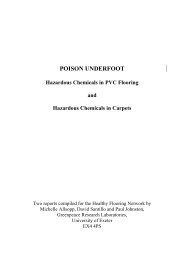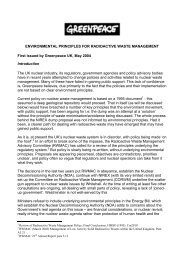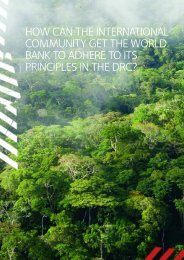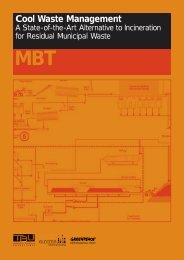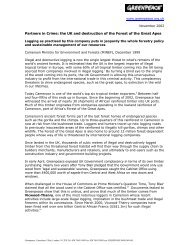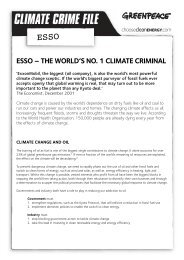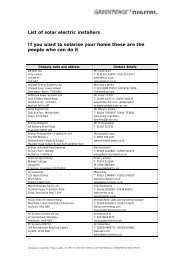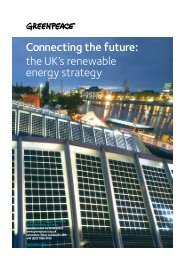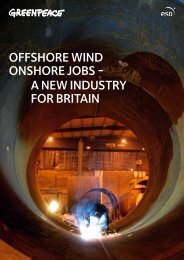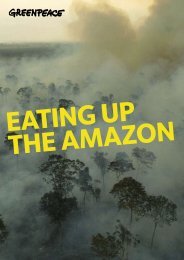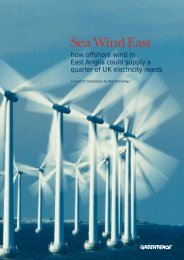The Real Green Revolution - Greenpeace UK
The Real Green Revolution - Greenpeace UK
The Real Green Revolution - Greenpeace UK
You also want an ePaper? Increase the reach of your titles
YUMPU automatically turns print PDFs into web optimized ePapers that Google loves.
f e rt i l i z e r, but re s e a rch is being undertaken<br />
as how to best utilize waste from the food<br />
p rocessing industry (Scialabba, 2000)<br />
Uganda is highly dependent on agriculture,<br />
which accounts for 45% of GDP, and<br />
employs 80% of the population. Coffee is<br />
a major crop, accounting for 40-70% of<br />
export earnings. In the past, political<br />
instability over two decades hindered<br />
agricultural modernization, and in<br />
consequence fertilizers and pesticides are not<br />
widely used except on tea, coffee and other<br />
export crops (e.g. tomatoes and salads). In<br />
general, most farms are small-scale and<br />
organic by default. Many small farmers do<br />
not keep livestock and therefore face a<br />
problem in building and maintaining soil<br />
fertility. <strong>The</strong> government is deeply committed<br />
to modernizing agriculture, to drawing it out<br />
of subsistence mode, eradicating poverty and<br />
increasing capacity for agri-food processing.<br />
However, they intend doing this along a<br />
conventional high input/output model. At the<br />
same time state support is being cut back,<br />
so responsibility for extension will fall<br />
increasingly to the private sector. <strong>The</strong>se<br />
elements of policy are antithetical to the<br />
development of an organic movement which<br />
feels it could otherwise fill the government’s<br />
objectives of reducing poverty and hunger.<br />
<strong>The</strong> task facing the organic movement in<br />
Uganda is to convince the state and farmers<br />
not to go down this path but to focus on<br />
developing natural methods of building soil<br />
fertility and controlling pests (Wajje, 2000).<br />
<strong>The</strong> Ugandan organic movement held its first<br />
conference in January 2001 to mobilize<br />
support and unity across the sector. It intends<br />
to set up a certification committee, which<br />
aims to develop domestic capacity for<br />
standard setting and certification.<br />
Organic coffee, sesame and cotton are<br />
already grown and exported (van Elzakker<br />
and Tulip, 2000). One project, run by the the<br />
Lango Co-operative, has more than 12,000<br />
farmers in 266 villages involved in growing<br />
organic cotton and sesame over more than<br />
100,000 acres. This project was initiated by<br />
a foreign development agency but has<br />
experienced problems through growing too<br />
fast. For example, it has had problems in<br />
securing access to markets and providing<br />
sufficient infrastructure – both in terms of<br />
storage and processing capacity and<br />
extension facilities. Management of the<br />
project has recently been taken over by Bo<br />
Weevil who are trying to put the project back<br />
on a sound footing and seeking the necessary<br />
finances to provide the infrastructure to meet<br />
the expectations of farmers who have<br />
converted to organic production. <strong>The</strong><br />
Ugandan organic movement believes that<br />
10-15% of Uganda’s coffee exports could<br />
realistically be certified as organic within<br />
5-10 years (Wajje, 2000), but the lessons of<br />
Lango show it is not only the farming<br />
element that needs to be developed in order<br />
to establish successful schemes.<br />
<strong>The</strong>re is also a strong NGO sector promoting<br />
organic agriculture within Uganda. Luyiga<br />
(1997) identifies thirty NGOs directly<br />
involved in this field. Church organizations<br />
(of a number of different denominations) are<br />
heavily represented and play an important<br />
role in fostering rural development. <strong>The</strong><br />
Department of Social and Economic<br />
Development (SED) is one such organization.<br />
It runs an organic demonstration farm and<br />
has trained over 300 animateurs and almost<br />
1600 farmers in soil fertility techniques, soil<br />
and water conservation, agroforestry, pest<br />
control methods and the role of livestock.<br />
Those who have been involved in the project<br />
have noticed increases in food production<br />
and household nutritional status (Luyiga,<br />
1997). Other NGOs include the Anziaceni<br />
Integrated Rural Development Project in<br />
Arua, which works with school drop-outs –<br />
teaching them the principles of sustainable<br />
agriculture and environmental protection –<br />
and the Bukonzo Sustainable Agriculture<br />
Development Association, which promotes<br />
organic dairy farming in Kasese (ibid.). More<br />
44


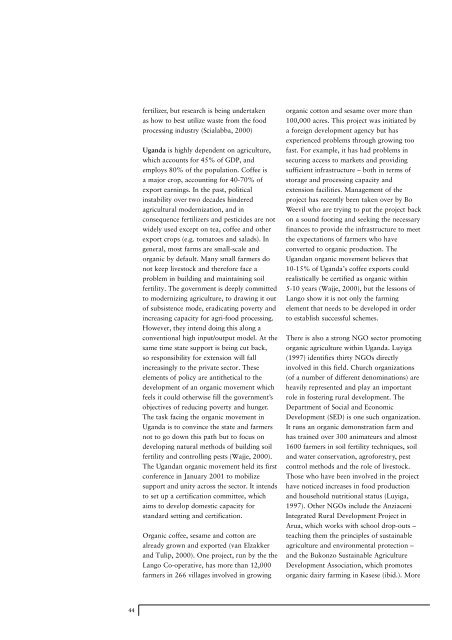
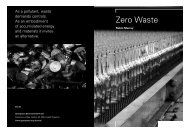
![[2007] EWHC 311 - Greenpeace UK](https://img.yumpu.com/22079793/1/184x260/2007-ewhc-311-greenpeace-uk.jpg?quality=85)
